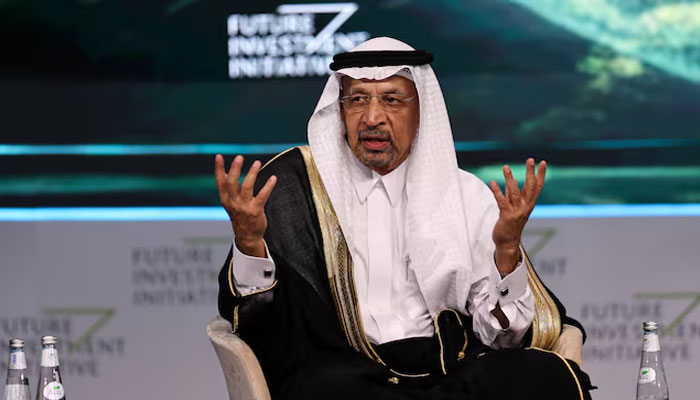
- Minister Khalid urges the PIF to make way for the private sector.
- The PIF president said last year that the fund would focus on national projects.
- The project is a core element of Vision 2030 with $900 billion in assets.
Saudi Arabia’s investment minister on Tuesday urged the kingdom’s Public Investment Fund (PIF) to ease its spending on domestic projects and make way for more private sector investment, as the fund prepares to draft a new strategic plan.
“It’s time for us to maybe reduce government or PIF spending to try and seed some of these value chains and clusters and let the private sector start investing,” Khalid al-Falih said Tuesday as financial titans gathered in Riyadh for the country’s biggest investment conference.
Crown Prince Mohammed bin Salman’s Vision 2030 economic plan has seen hundreds of billions spent on projects designed to transform the kingdom’s economy away from its dependence on hydrocarbons.
At last year’s edition of the Future Investment Initiative (FII) conference, PIF President Yasir Al-Rumayyan said the fund would leverage more of its resources to finance domestic plans to wean the economy off oil and said the fund planned to cut its overseas investments.
But many of the plan’s flagship projects have been delayed amid low oil prices and a budget shortfall that has forced Saudi Arabia to prioritize and downsize.
Saudi Arabia’s PIF, one of the world’s largest sovereign wealth funds with more than $900 billion in assets, is at the heart of Vision 2030. The fund’s initial strategy for 2021-2025 ends this year and it is due to announce an updated strategy.
Foreign investment in the country has grown 24% in 2024 to $31.7 billion, Rumayyan said Tuesday as he opened the event, where attendees included Colombian President Gustavo Petro, Blackrock’s Larry Fink, JP Morgan’s Jamie Dimon and Citi’s Jane Fraser.
Falih later added that 90% of that foreign direct investment was in Saudi Arabia’s non-oil sector, without mentioning details.
“We just did a transaction here in the kingdom and we had five times more demand than we could meet. It was for a pipeline in Jafurah, and the amount of money that was interested in investing here in the kingdom was at a record level,” Fink said on a panel.
“To me, this is just an indication of the transformation here in the kingdom, but more importantly, across the region, and I think we are increasingly seeing, as the GCC, become one of the major destinations for capital.”
That deal with Jafurah, which raised $11 billion upfront for Saudi state oil giant Aramco in return for payments over 20 years to investors, is in the exact sector the kingdom is trying to reduce its dependence on.



